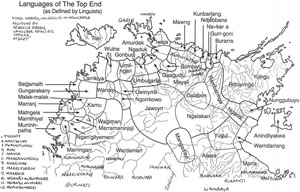Four Corners 2009 program on bilingual education
Reporter: Debbie Whitmont
Broadcast: 14/09/2009
Reporter Debbie Whitmont travels to the Top End to discover what will happen following a government move to scrap a controversial 35-year-old experiment in bilingual education.
When it comes to selling Australia as a tourist destination it goes without saying that Aboriginal language is part of the Australian identity. But in the classrooms of the Northern Territory Indigenous language is not in favour.
Last year national tests found four out of five children in remote schools didn't meet basic standards of English literacy. The Northern Territory Government decided that bilingual schooling was a major cause of this poor performance.
In October 2008 the then minister Marion Scrymgour made a decision that from January 2009 all schools must teach the first four hours of classes in English. For remote area bilingual schools and the communities they serviced it was a major blow.
"It's a matter of commonsense that in all education, whether you're teaching people of five, nine or ninety you've got to go from the known to the unknown." Senior educator
For others it was simply a knee jerk reaction. One senior academic who went to see the minister claims she told him she had been too hasty in making the decision.
"She said, look, I fucked up. And I think what she was referring to is that there was a lack of consultation beforehand and that the application of her four hour English directive ... had many unintended consequences."
The government though did not back down. In fact the Chief Minister told Four Corners he completely supports what's been done:
"We are not banning the speaking of Indigenous languages, the teaching of Indigenous culture in our schools. What we are saying explicitly is that we should have the same expectations for these kids to get to benchmark in years 3, 5, 7 and 9 along with all other kids."
But the decision to stop the bilingual program ignores much available research that shows even those schools primarily using English performed badly in tests.
"Well I was really shocked. I was shocked because there was no consultation with communities ... other schools by and large already had the first four hours of English in any school day and yet their results were still terrible." Jane Simpson
To find out the rationale behind bilingual education and to look at how it has performed, reporter Debbie Whitmont went to two Aboriginal communities in the top end, Lajamanu and Yirrkala. In 1986 Four Corners went to Lajamanu to look at what was then considered an innovative and apparently successful program of bilingual education.
Returning there, the program looks at what happened to the bold experiment of bilingual education. It also asks how the new policy, making English the dominant teaching language, would impact on the students. Perhaps not surprisingly the people there felt their view had been ignored and their culture devalued...
"It's like when you lose your loved ones, you feel the same way when you lose your language," Zachariah Patterson
"Well I think language is a large part of people's identity and their pride in who they are." Wendy Baarda


